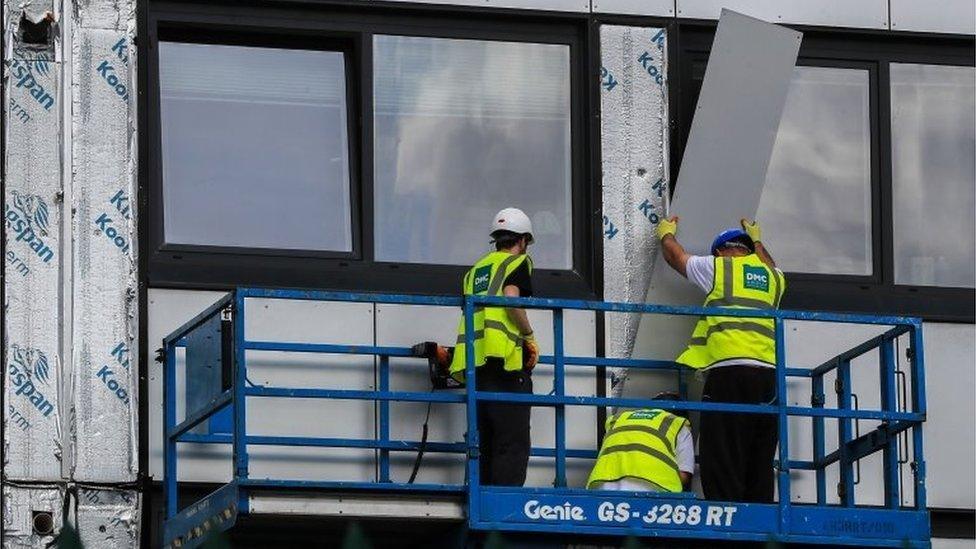Cladding crisis: 'I feel constantly sick and stressed'
- Published
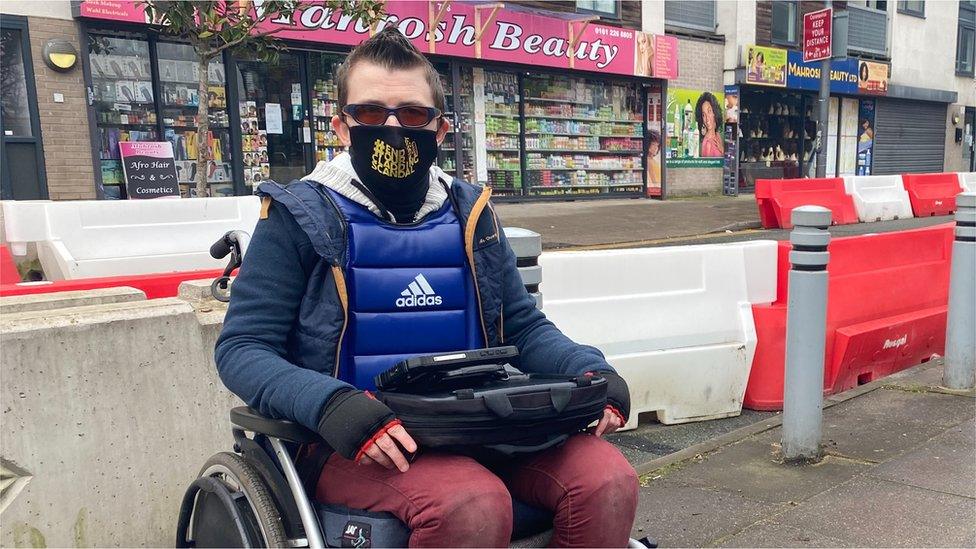
Georgie Hulme: "Each day I panic that a bill will arrive"
Georgie Hulme inherited her third floor flat in Manchester from her mother, who thought she was providing her daughter with home security for life.
Since then, inspections of the building in the wake of the Grenfell Tower fire have exposed major fire safety problems, including dangerous cladding.
Ms Hulme, 42, who has disabilities and can't work, now fears bankruptcy due to spiralling repair bills.
"I feel constantly sick and stressed. These buildings were built unsafe, so no leaseholders should pay for something that's not their fault," said Ms Hulme.
Thousands of disabled leaseholders, often on low incomes or benefits, warn they are financially and physically trapped by Britain's cladding crisis.
Ms Hulme has Tourette's Syndrome and uses a text to speech device to communicate.
Her block, part of the Life Buildings apartment scheme in south Manchester, is less than 18 metres tall, which means it isn't eligible for the government's £5.1bn Building Safety Fund for cladding repairs.
Ms Hulme could be forced to take out a long-term government backed loan, capped at £50 per month, to fix the faults.
"I've been unable to work for many years and am reliant on state benefits. It's impossible for me to access the sums of money needed," she said. "Each day I panic that a bill will arrive."
The developers of the building have folded, leaving leaseholders with no recourse to challenge them, or compel them to contribute to the remediation work.
The managing agents of the Life Buildings, Scanlans, said leaseholders who bought properties in good faith with appropriate certification have been placed in an "impossible position".
"We are pursuing all avenues of available funding in support of leaseholders and will continue to do so," a spokesperson told the BBC.
Emergency evacuation plans
As well as the economic burden, there are safety concerns about apartment blocks that come with cladding - how to escape in the event of a fire.
The Grenfell Tower Fire Inquiry has heard that at least 22 disabled people lived above the 10th floor of the 24-storey west London block at the time of the fire. The blaze, which broke out on 14 June 2017, killed 72 people.
The inquiry chairman, Sir Martin Moore-Bick, said personal emergency evacuation plans for disabled people should be required by law in all high-rise blocks - helping to protect more than 160,000 vulnerable people in England and Wales.
But the Home Office has proposed evacuation plans for far fewer disabled people.
Only about 5,300 disabled people who are living in tower blocks will have access to Waking Watch, external - a fire safety system where staff continually patrol all floors and the external areas of a high risk building to give warning to evacuate in the event of a fire. A consultation is ongoing.
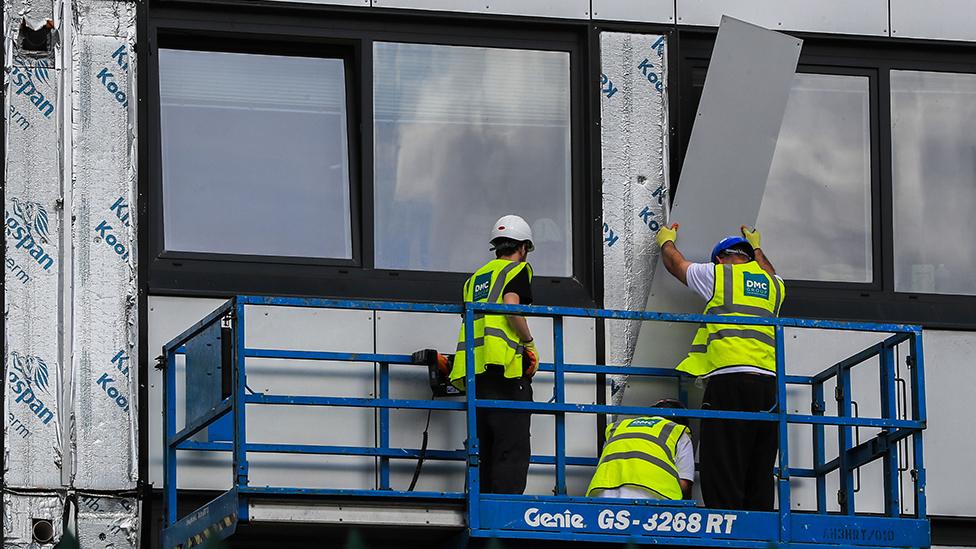
Disability rights campaigners say the unique needs of those with mobility issues have been overlooked in the wider debate about cladding.
"We're going to be pressing the government to make it law for these emergency evacuation plans to be the standard," said Fazilet Hadi, head of policy at Disability Rights UK.
"The cladding crisis is having two enormous effects on disabled leaseholders. First, the costs are astronomical. Disabled people haven't got the money to meet them.
"The second huge issue is people having the peace of mind that in a fire they have an emergency route to safety."
'Devastated and betrayed'
Disabled people are more likely than non-disabled people to face barriers to paid employment and work fewer hours, according to analysis from the Joseph Rowntree Foundation.
It's estimated that four million people with disabilities in the UK are living in poverty. Yet many are now being asked to pay tens of thousands of pounds for building repairs and other interim fire safety measures.
Former solicitor Sarah Rennie, who is 35, has a muscle wasting condition and is supported by assistants 24 hours a day.
She bought her two-bedroom flat in Birmingham in 2008 with help from her parents. As a wheelchair user, it's been specially adapted to her needs.
In 2019, Ms Rennie and 180 other leaseholders at Brindley House were told that their homes were wrapped in dangerous cladding.
Ms Rennie's share of the repair bill could be more than £50,000, if the work isn't covered by government funding.
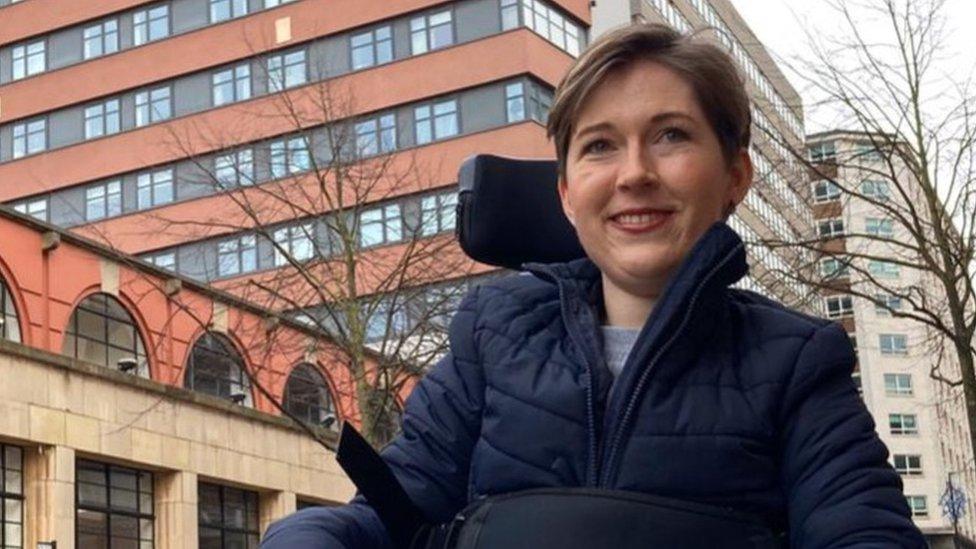
Sarah Rennie fears many fellow flatowners could be bankrupt before cladding work begins
"You feel very devastated and betrayed," said Ms Rennie. "I would need to look at a second mortgage (to pay the bill), but for me that's really difficult.
"I've already had a mortgage which I've paid off because I knew I would not be able to work longer due to my disability."
She added that as a disabled person, often there is a feeling that one's independence and control could be taken away at any point.
"I've just built up a small modest little life for myself and the fact that that could be taken away from me is frightening," she said.
Ms Rennie, who works as an accessibility specialist in the transport sector, said other costs were going up rapidly too.
"My service charge alone is £500 a month and that covers insurance bills and fire warden patrols, known as Waking Watch. Many of us will be bankrupt before the works have even started."
To add to her worries, the firefighting lift in Ms Rennie's block does not meet fire standards.
As a wheelchair user, she has worked with her building's management to get an evacuation chair and an emergency exit plan.
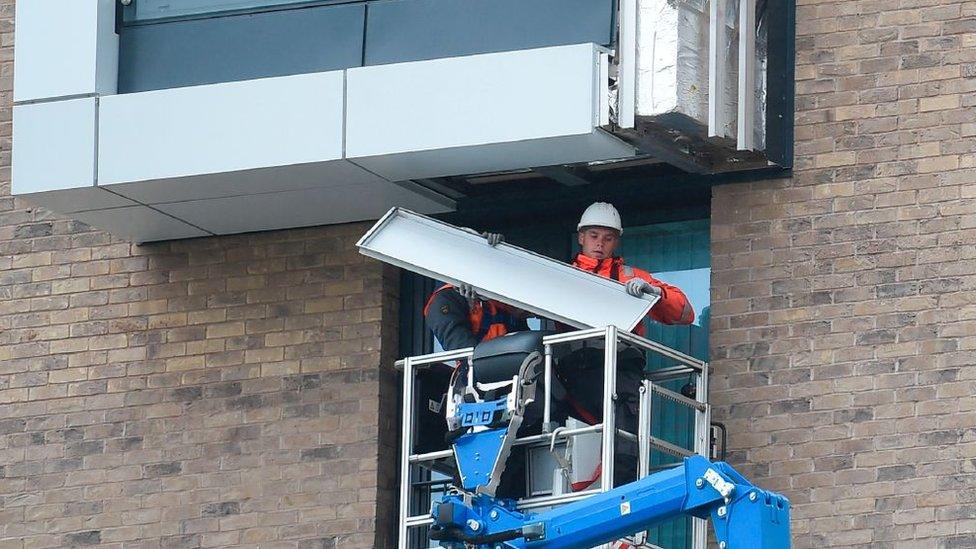
Workmen removing external cladding from a building in Manchester after fire safety tests in the wake of the Grenfell Tower tragedy
Elsewhere, others have not been so lucky and the debate around who should pay for these emergency plans has become toxic.
Ms Rennie said some disabled people have been told "you shouldn't live in high rise blocks, you should be in a bungalow".
The government says it is implementing the Phase 1 recommendations of the Grenfell Inquiry to ensure such a tragedy can never happen again.
"We continue to work with disability groups to improve accessible housing and to develop improved guidance for evacuation," a government spokesperson said.
The government has also allocated £5bn to protect those in the highest risk buildings from unaffordable costs, but that funding "does not absolve building owners of the responsibility to ensure their buildings are safe".
Ms Rennie and Ms Hulme have co-founded a new campaign group called CladDAG Leaseholder Disability Action Group, to raise awareness of the complex ways in which thousands of disabled leaseholders are affected by the escalating building safety crisis.
- Published17 March 2021
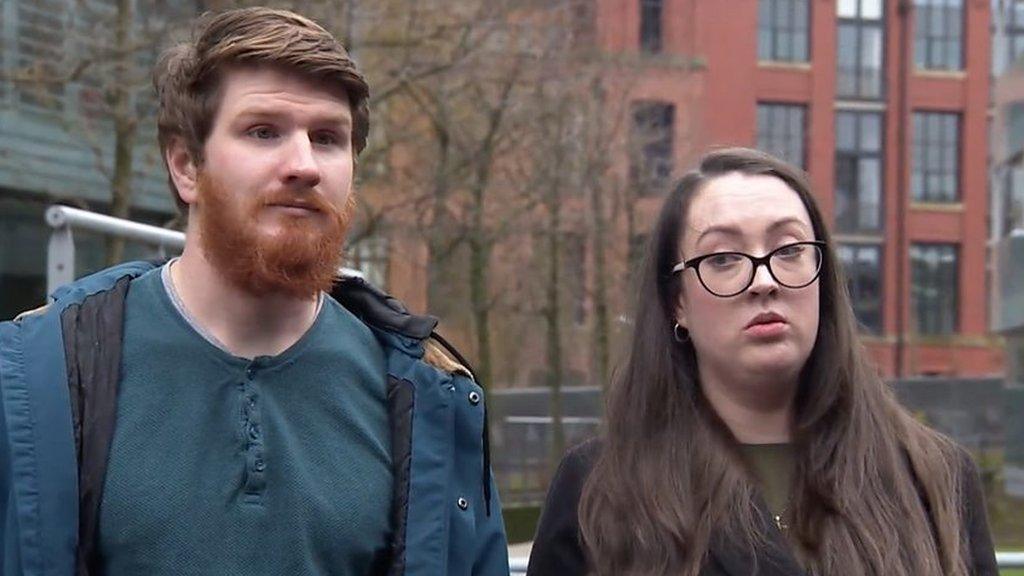
- Published13 June 2022
